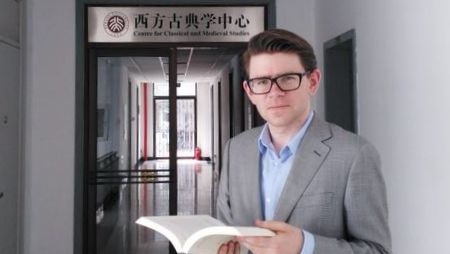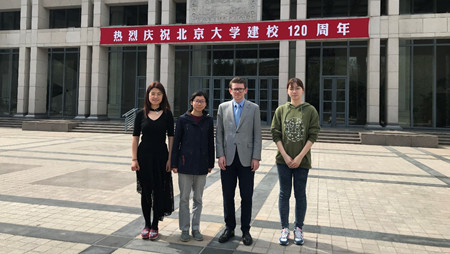[120th Anniversary Special] Dr. Hendrikus van Wijlick: Western Classical Studies in China
Apr 30, 2018
Peking University, April 25, 2018: In 2014, Dr. Hendrikus van Wijlick, a Dutch historian, decided to take a job at Peking University. Four years later, he has taught ancient Western history, Latin, and ancient Greek to numerous students and has helped to establish the first standardized test for Latin and ancient Greek in China.
 Dr. Hendrikus van Wijlick
Dr. Hendrikus van Wijlick
From the Netherlands to China
Dr. Hendrikus van Wijlick is currently an assistant professor in the Department of History and in the Centre for Classical and Medieval Studies. He was born in the Netherlands and obtained his bachelor’s and master’s degree at Radboud University Nijmegen there. He then transferred to Durham University in England, where he obtained a second master’s degree and a doctorate in the Department of Classics and Ancient History. After teaching at Durham as a graduate teaching assistant for some time, he decided to come to China and continue his teaching at PKU.
Dr. Van Wijlick’s teaching experience started as a graduate teaching assistant at Durham. “Being a teaching assistant at Durham is different from being a teaching assistant here at PKU in that one has to teach groups of students independently. Course coordinators would generally only inform you of the topic and the ancient sources that are to be covered. How you design your class, what are you going to talk about, what are you going to discuss with your students is all up to you. It’s your own responsibility. You are also responsible for grading commentaries and essays.”
He still remembers his first day of teaching at PKU vividly. “It was in September 2014. On a Monday morning, at 8 AM. It was a Greek class. I was stunned by the large number of students I saw upon entering the room. And the fifty or so that had turned up were sitting ready at least fifteen minutes before the class was scheduled to begin. I did not expect that it would be full.” He was also astonished that even in the first class, students started to ask questions about Greek accent. “The Greek accent is very complicated, and you generally say in the first class to students ‘don’t pay attention to the accents, it’s too complex for now,’ and yet I get questions about it in the first class from students who were clearly already familiar with the basic workings of the Greek accent,” explained Dr. Van Wijlick. “That really struck me because this is something you would definitely not get at Durham. The students in Durham would be very happy when you say to them that is too difficult, let’s do it later. Because you need to have some more experience in reading and also, you need to have some basic knowledge of grammar before you can understand how the accent behaves.”
Teaching at PKU
When it comes to teaching, Dr. Van Wijlick is a strict and principled teacher. He said that teaching at PKU is not much different from teaching at Durham. He only provides more guidance for first-year students who might still have to get used to lectures in English. “For more advanced students, this is not necessary any more.
However, the course system at PKU is very different from which Dr Van Wijlick had in the Netherlands when he was a student. “PKU students have a lot of freedom in choosing their courses, which I never had as an undergraduate,” said Dr. Van Wijlick, “because there was one curriculum and you just had to follow it. The number of elective courses was very limited.”
Dr. Van Wijlick also noticed that undergraduate students at PKU needed to take more classes in one semester than for example at the University of Durham. When asked about whether he would make changes accordingly, he said that he cannot ask the students to do as much homework as in Durham. “This applies especially to my Latin courses, not so much to the courses in history. Despite the heavy workload, I would still ask all my students to give presentations during the course. This is difficult for them, but overall they tend to enjoy doing this.
In terms of teaching methods, he said it depends on the aims that he tries to achieve. He not only gives lectures but also asks students to do discussions and group presentations. He believes that group presentations are challenging but rewarding. “I do group presentation every year. It’s challenging, and it should be challenging because research is challenging,” said Dr. Van Wijlick. “I don’t give answers to the students. I just give them advice on how they can do the presentation and what they can read. They have to do it by themselves. And they may end up with even more questions than when they started to do the presentation, which is good because there is usually not one right answer.” He sees this as a preparation for future studies, because “that is how it’s going to be when you conduct on a postgraduate level.”
He compares learning Latin with learning Chinese. “It’s frustrating,” he admitted. “You can only learn it by working hard. There is no trick, there is no short cut. You just have to learn it.” He believes that hard work and motivation are the keys to learning languages. “You should spend one hour each day on learning new characters and reviewing the old characters. And probably, within half a year, you have forgotten the characters you have learned six months earlier, and you have to learn them again. In addition, you need to keep reading and find your motivation.”
Another principle that Dr. Van Wijlick adheres to is not to be sluggish at the beginning of the semester. “I don’t start slowly. Because if a teacher starts slowly in the beginning, then students for whom the course is actually too difficult may get the impression that they can manage. It is not desirable for students to quit the course only mid-term, since by that time it will no longer be possible to change to another module.”
Ancient Western History and Modern-Day China
When asked about the role ancient Western history plays in modern-day China, Dr. Van Wijlick pointed out that it helps students understand how Europe works. “If you want to understand Europe, you have to understand some of its histories. Not only history as such but also how Europeans value and regard their own history.” He mentioned that in the Netherlands, students in the highest level of secondary schools are still asked to learn either Latin or Greek.
He used the Middle Ages and the rise of Christianity as an example. “You can see the values in society are still very much Christian,” he observed. “It has been a determining force, at least in Western Europe. If that is not understood, then Europe cannot be fully understood.” He further stated that it is also the same for Westerners who want to understand China. “If you want to understand China, you have to know a bit of its history.”
In terms of the difference between studying Antiquity in China and abroad, Dr. Van Wijlick believes that it is important to communicate with the Western academic circle while maintaining China’s own characteristics. He emphasized the importance of keeping contacts with Western scholars. “It is important to keep these contacts abroad not only to have the best resources, but also to be up to date with all the debates and exchange views with scholars from across the globe. He also thinks that it is beneficial for the students who want to go abroad and also for the vitality of China’s academic circle.
Dr. Van Wijlick also emphasized that it is important to maintain China’s characteristics so that we can offer fresh views to the world. He gave us an example: “In China, historians write history to give something back to society so that the society can learn from it. This idea is alien to historical research in the west. We conduct historical research for its own sake.”
Developments in Western Classical Studies
One of the things that Dr. Van Wijlick is particularly proud of is the establishment of the standardized tests for Latin and ancient Greek. He considers it to be the main development over the past few years. He has promoted it together with several other teachers. “This was an idea by professor Peng Xiaoyu. We shall have our second test for Latin this weekend and our first one for Greek.” He then explained the importance of having a standardized test: “It is essential to have an accepted standard so that everyone knows what elementary and intermediate level is.”
Dr. Van Wijlick believes that the study of Antiquity is rising in China. “We have more and more classical programs at universities in China. What is more, at Beijing Foreign Studies University, a major in Latin will be offered. . The idea is that upon finishing this degree, students will be fluent in Latin, not only in reading but also in speaking and writing.”
One of the disadvantages of conducting classical studies at PKU is that it can be difficult to find the resources he needs. He has to solve this problem in different ways: “Sometimes I can buy the book; mostly I try to ask the library to get it but it is not always possible. Sometimes you have to depend on other people to scan it for you, but I try to minimize that because it’s a burden on other people.” Through his and other teacher’s effort, a good collection of academic books on antiquity studies has been built up. “Staff at the main library and at the departmental library have been very helpful in achieving this”.
Although living in China, Dr. Van Wijlick still keeps contacts with foreign scholars. “I have my contacts abroad, I keep them, and I try to expand them and try to use them for the university so that the university can benefit from it.”
Work, Research, and Daily Life
Being a teacher, a researcher and a promoter of antiquity studies is not easy, but Dr. Van Wijlick has managed well through careful planning. “You have to plan in three different ways: important things for the long term, things for the middle term and things for the short term. For short-term plans, I write them in my diary. But things for research are much more dependent on goals that have to be achieved in the long term, which could be next year or even the year after. There are also other things to worry about. For example, we have to consider improvements or changes to the program and to the teaching. That is even planning for much further in the future. But that also has to be done. It means you have to divide your task up into smaller tasks and you have to determine when you are going to do these things. Because if it is a large task, you cannot wait for three years to begin. You have to divide up the task and reserve some time for it.”
Dr. Van Wijlick’s current interests are Roman foreign relations in the late republic and Roman private law in the late republic. “I’m working on that and writing some articles,” he said. “I think that will keep me busy for the next few years. I have plans for at least until 2020.”
 Interviewed by students
Interviewed by students
Reported by: Xu Penghang
Edited by: Liangdi Xu

